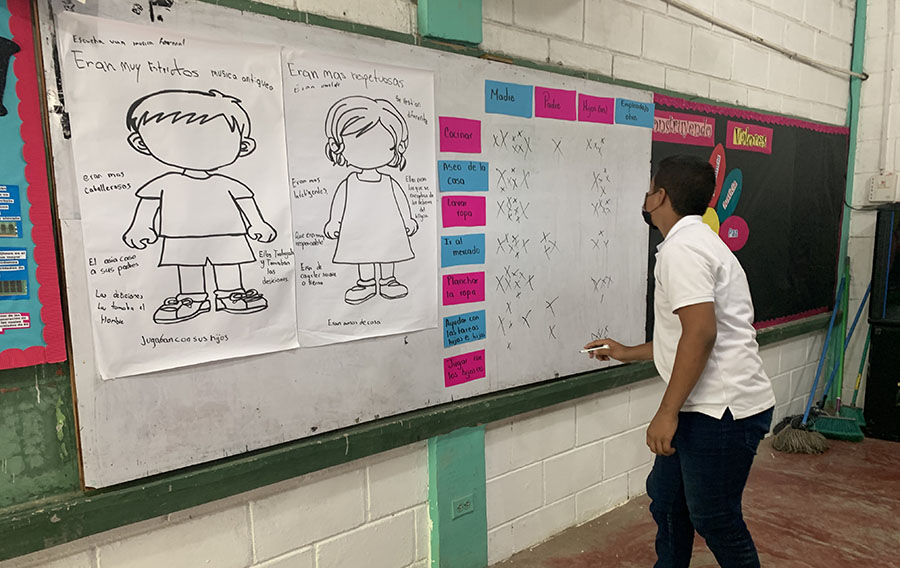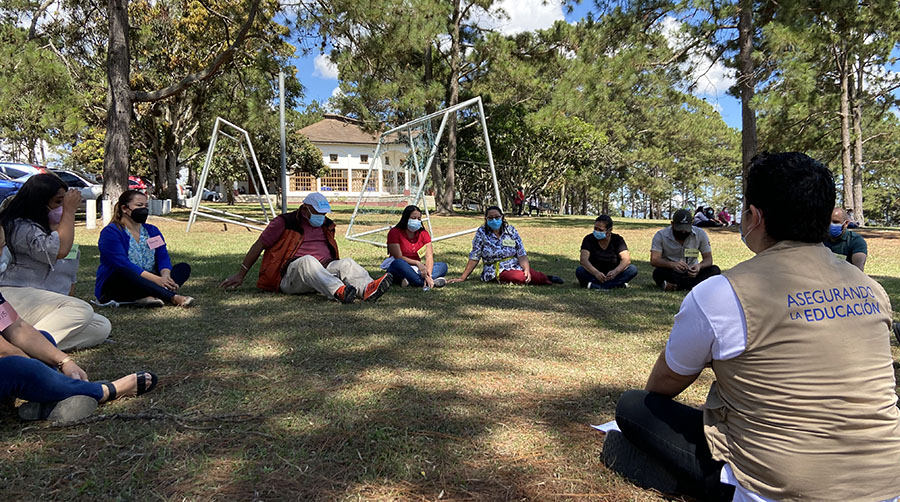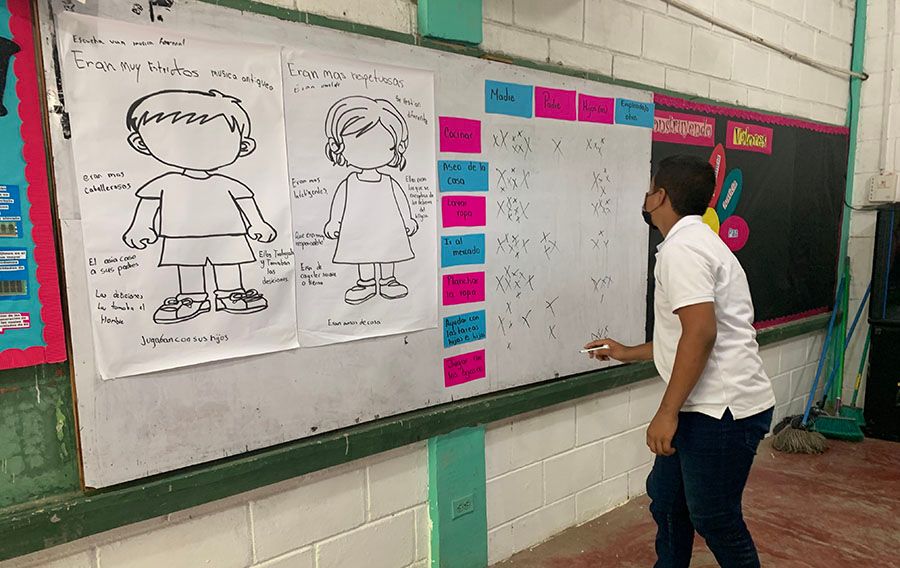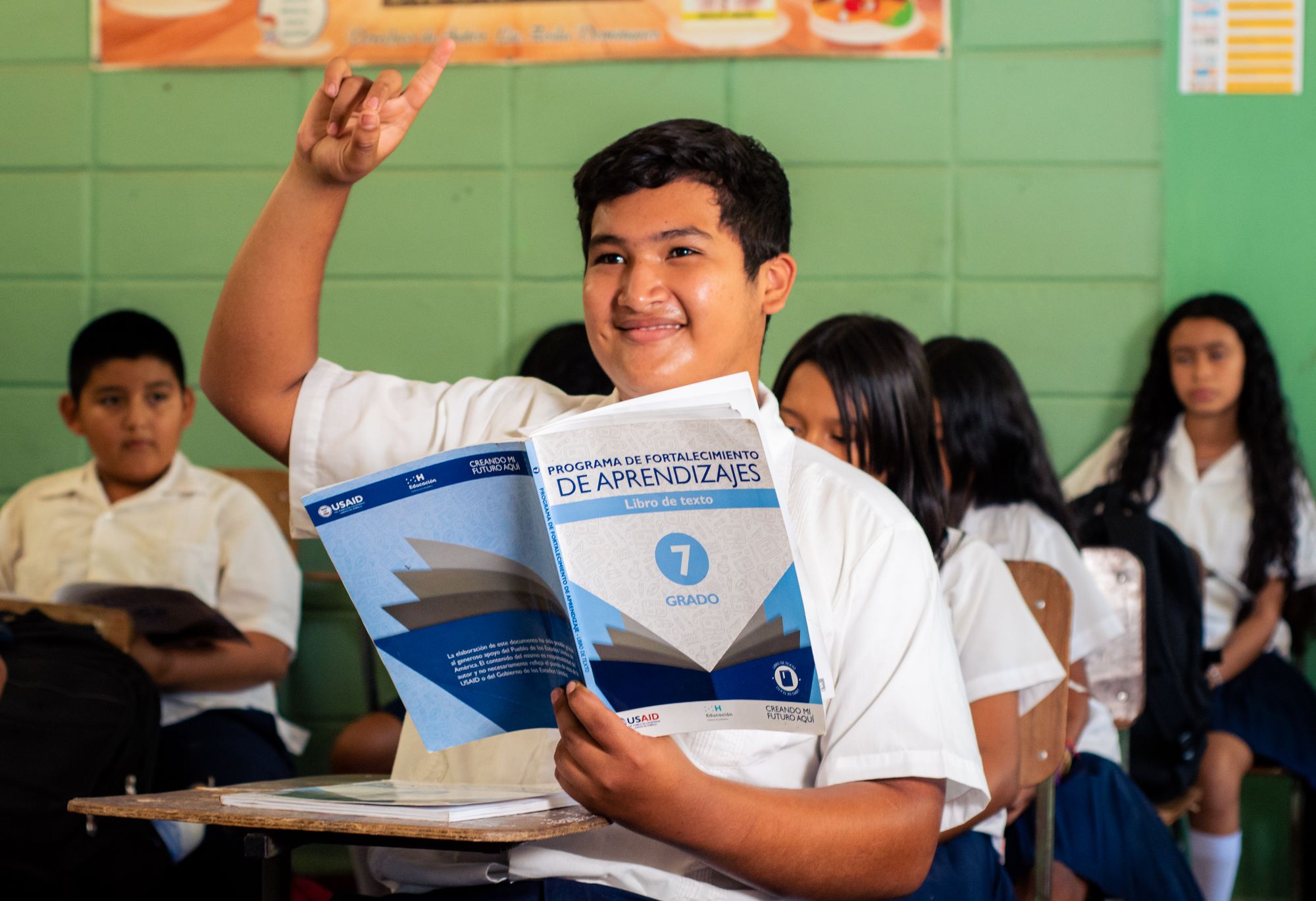Persistently high levels of violence in Honduras drive irregular out-migration, with harmful consequences for young Hondurans. When parents leave the country without their children, the resulting family disintegration leaves young people even more vulnerable to gangs and violence, which often bleeds onto school campuses and impedes learning for all students. Unfortunately, many schools lack the resources and training to implement violence prevention activities that would support vulnerable youth and improve enrollment and retention.
The U.S. Agency for International Development’s School-Based Violence Prevention Activity, known locally as Asegurando la Educación, is led by DAI in 200 schools from 11 cities across Honduras. Our work helps students feel safer in their schools so they can commit to their education, graduate, and pursue careers in their communities, rather than migrating. Asegurando engages with educators, students, families, government authorities, and community actors to strengthen safe, inclusive learning spaces while building institutional capacity to sustain these efforts.
Honduras has the highest femicide rate in Latin America and young women and girls especially experience high rates of physical and emotional violence. Accordingly, Asegurando integrates a gender and social inclusion (GESI) lens in all its activities. Raising awareness, mainstreaming gender topics—including roles and stereotypes—and addressing social perceptions of equity and inclusion are all contributing elements of gender-based violence prevention. When combined with efforts to promote social-emotional learning, well-being, and psychosocial support, GESI themes contribute to safer learning spaces, which support improved academic performance, retention, and graduation rates.
The following examples illustrate how Asegurando helps to prevent gender-based violence in schools by integrating equity and inclusion into its interventions.
Changing Community Perceptions
In Honduras, especially in poorer communities, rigid social norms adversely affect both men and women. According to the United Nations, women and girls spend an average of 17.3 percent of their time on unpaid care and domestic work, compared to 4.3 percent spent by their male counterparts. This burden can interfere with a girl’s education and career prospects, leading to economic dependence.
“A lot of women and girls have grown up [being told], you are a woman, you have to do this, you have to do the washing, you have to iron, you have to cook,” as one student from La Ceiba put it. On the other hand, men and boys in Honduras are often conditioned to believe they must be strong providers who lead households in an authoritarian manner, based on fear. They must always present themselves as strong and are told not to cry or express emotions. For male students, this can make it even more difficult to deal with challenging situations and find healthy outlets for emotions and trauma without turning to violence.
Asegurando facilitates programs for the school community to encourage positive change. All of the social-emotional learning (SEL) programs, such as Influencer 504 and School-for-Parents, promote GESI by discussing domestic roles and responsibilities and focusing on issues of equity, equality, empathy, and respect, to name a few examples. Asegurando also supports school leaders and School Community Committees—parent-teacher-student groups that analyze problems in their schools and design solutions to strengthen safe learning spaces. Committee members participate in training sessions that emphasize equal gender roles, social inclusion, and gender-based violence prevention. Student leaders become peer educators by sharing with their classmates what they have learned. The students also use the violence-meter (violentómetro), a thermometer-like visual that helps raise awareness of preventing violence in relationships.
According to 10th grader Zenia Amaya, who became the first female president at her male-dominated school, normalizing GESI and openly discussing equitable gender roles and respect in schools makes a huge difference. Young women and girls “can see the change and instead of migrating, we can stand up for our rights,” she said.
“By teaching our students about the important role women play…they respond with their support so that each student (boys and girls) will be represented in decision-making spaces,” said Melvin Lago, a teacher at the German Technical Center Institute of Honduras.

Gender Training and Support for Educators
For too many educators in Honduras, violence is a constant shadow in their classrooms and their interactions with students. Educators find themselves on the frontlines, acting both as mediators and confidants for students, especially students with no support at home. These stories of trauma, violence, and abuse lie heavy on teachers, who strive to act as both educators and protectors. On top of their own personal challenges, this burden can place undue stress on teachers, making it more difficult for them to provide support. Sometimes, the violence that takes place among students in schools is gender-based and many educators lack the training to respond. One counselor in Tegucigalpa shared her experience supporting a young girl who had been raped and impregnated by her stepfather. “It is hard…[because] there are gangs,” said the counselor. “It gets to the point where [we are limited in] how we can report the complaint of abuse because they say, ‘the gang will come after them.’”
Asegurando uses two programs to equip educators to support their students in violence-related challenges: Educators for Peace and Teacher Well-being. The former, a professional development program, devotes an entire module to the types of violence that can affect education, based on the human rights framework, child protection, and gender-based violence prevention. The module incorporates basic gender concepts, stereotypes, and social norms related to femininity and masculinity, and teaches educators to recognize signs of gender-based violence and transgression in the classroom. Approximately 4,300 teachers have completed or are in the process of completing the Educators for Peace program.
The Teacher Well-being program equips educators with gender- and trauma-informed responses to the challenges they encounter. As in-person learning resumed after the COVID-19 pandemic, students and teachers alike carried with them the experiences they had undergone over the previous two years, and Teacher Well-being sessions helped educators deal with these and other challenges. Teachers learn deep breathing and other relaxation techniques to help manage their emotions. They also discuss challenges their schools face and collaborate with colleagues to share the emotional burden of addressing these challenges. Since 2018, more than 13,000 educators have participated, contributing to healthier learning environments for approximately 800,000 students.

Psychosocial Support for Students
For students, having an educator or school counselor who is emotionally available can help them to overcome challenges and stay in school. In many cases though, students who have experienced trauma or gender-based violence need clinical support. For families already struggling with poverty, the additional costs of an unwanted pregnancy can be devastating, exposing girls to further physical and emotional jeopardy.
One 15-year-old girl described what happened when she told her family she was pregnant: “[They] beat me; they scolded me. I felt judged by my own family, I didn’t know what to do. I just cried.” On top of the physical changes of pregnancy and the pressure of raising a child, this kind of experience can discourage girls from finishing their education during or after pregnancy. Those who do stay in school face social isolation in the classroom.
Asegurando’s Staying Positive program comprises 16 group therapy sessions, with a focus on psychosocial support for students at risk of falling victim to or being perpetrators of violence in the school community. Counselors use a screening tool to help identify referred students who have experienced gender-based violence, either as victims or perpetrators. Typically, such students disrupt the school environment and struggle with their grades, but after their participation, they often become leaders of positive change. Facilitators convey GESI messages throughout the sessions, while recognizing the diverse challenges and experiences that bring the students to the program.
An 11th-grade girl from Tegucigalpa who was participating in the program was on track to be the first in her family to graduate from high school. When she found out she was pregnant, she was devastated, and her family was shocked. Seeking advice from her counselor and teachers, the girl realized that she did not want her new challenges to prevent her from graduating. “The most important [thing] is to make the girl feel [and understand] that even though she is pregnant, she is important. She is a woman who [is valued and deserves respect]. She is special,” said her counselor. The student is now determined to complete high school, and—with the support of her counselors and school—she is on track to do so. “I had the option to leave school…but many people advised me…they told me to stay in school…that I could be someone in my life.”
Asegurando has trained approximately 3,800 educators and school counselors from 1,453 schools to provide psychosocial support.
By incorporating GESI themes, Asegurando is championing respect, equity, and inclusion as social norms that will serve as the first line of defense against gender-based violence in the school community. Asegurando is working with the Ministry of Education to make these school-based violence prevention practices sustainable and scalable. Through the consistent implementation of such practices, authorities, teachers, and students at partner schools are better equipped to promote safe learning environments and mainstream gender equity inclusion in Honduras.





